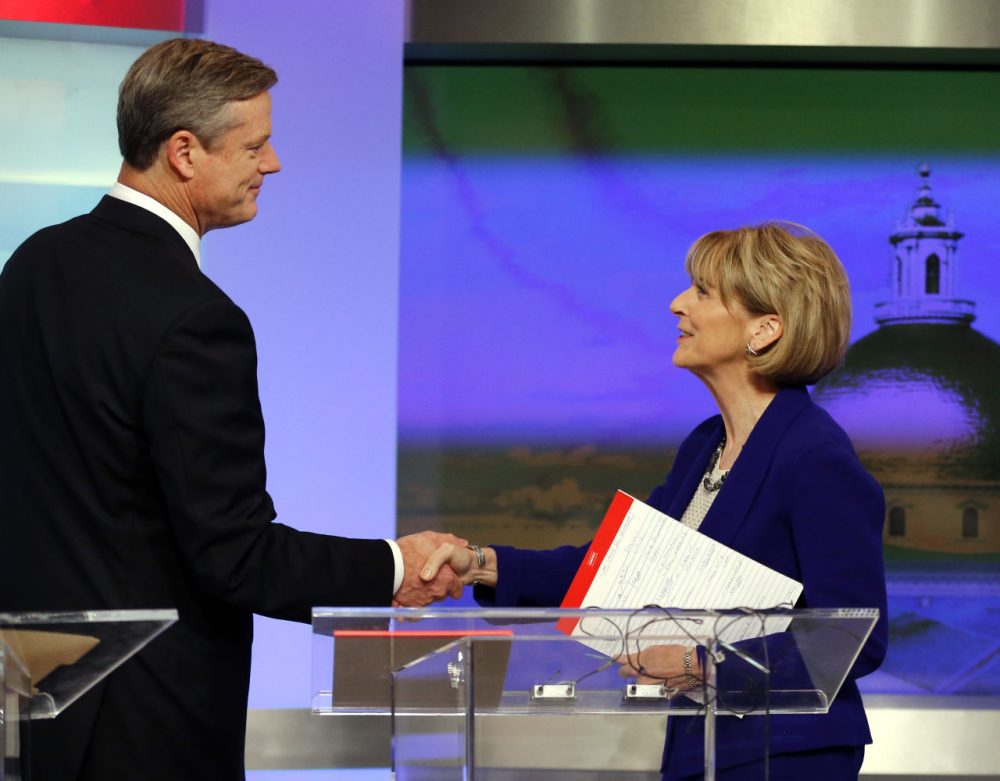Advertisement
Commentary: Debates Could Determine A Close Gov's Race, But Are Voters Watching?

The gubernatorial debates might determine who wins this close race, Democrat Martha Coakley or Republican Charlie Baker.
Three more debates are scheduled: October 21, 27 and 28.
But so far, they've raised more questions than answered:
Are many voters watching the debates? It’s not like the old days when a debate would be broadcast in prime-time on nearly all channels. And this gubernatorial race isn't as exciting as many past state contests. Indeed, a lot of Massachusetts voters seem more interested in the U.S. Senate race in New Hampshire. Most important, are undecided voters watching? Many undecided voters are undecided because they aren't interested enough in politics to watch this kind of debate.
Are supporters proud of their candidates’ performances? Neither candidate seems to be a “happy warrior” on stage. Baker wins praise for not having the complaining tone he had in 2010, but that is not to say he comes across as upbeat and inspiring. To his fans, he seems sincere and confident; to Coakley fans, he seems lackluster and condescending. Coakley has not won praise for being “new and improved.”
Are the candidates, in effect, surrogates for their super PACs? This is a rhetorical question; of course they are running in their own right. But the more intense debate is not the one between the candidates, but rather the advertising battle between their better funded super PACs. Compare the debate audience, a sliver of the population, with the audience that views the TV spots and you’ll understand why both candidates were unwilling to call on their PAC allies to stop running “misleading” ads against the opponent. Both candidates, especially in this tight race, feel that the super PACs supporting them are key to their being able to win. Both hope their super PAC allies will deflate the opponent so they don’t have to be so negative themselves and risk backlash.
Hypocrisy is not new to political fundraising. President Obama recently knocked the GOP as the “party of billionaires” at a $32,000 per plate fundraising dinner at the $26 million home of a billionaire named Rich Richman. But campaign finance laws encourage not only hypocrisy, but deceit. Individual donations to state candidates are limited to just $500, which makes raising millions extremely difficult for all but the most well-connected incumbents. So candidates are thought to covertly arrange for friends to set up “independent” expenditure groups that raise large sums from special interests.
By law, candidates can’t direct super PACs or their ads. But, in debates, the candidates can be just as misleading as super PAC ads when claiming total ignorance of what their friends are doing.
Do debate formats allow for real debate? Candidate debates often seem less like debates, with reasoned arguments and rebuttal, than joint press conferences. “It’s your turn to answer – in 30 seconds – and then we move on to a new question.” Given the modern viewer’s attention span, we’re not going back to Lincoln-Douglas debates, with a 60-minute opening by one candidate, then 90 minutes by the opponent, and a 30 minute rebuttal. But we shouldn't be surprised that we get only superficial answers about complex issues when there are 60 second time limits – or a “lightning round” of yes or no answers. And note that there is never an “enlightening round.”
The three independent candidates are understandably miffed that they were not included in many of the gubernatorial debates. But it’s equally understandable that sponsors didn't want a debate where 60 percent of candidate time went to candidates who collectively were under 6 percent in most polls.
Where’s the suspense? Debates stand out from most TV fare in that they have not improved over the years. The rest of television has been pioneering and attracting larger audiences with more entertaining content. But debates are ever more predictable because the candidates are so scripted and rehearsed, so intent on saying nothing new for fear of making a gaffe.
Should debates be more interactive? Debates that have tried to be more innovative haven’t really been more exciting than standard debates. Maybe debates would be more illuminating if they were more of a “reality” show. Maybe candidates shouldn't be told in advance what live audience they’d be taken to — it could be a family reunion, a PTO, a police station… Then they’d pick questions out of a hat, and the candidates would talk as long, or as little, and interrupt or be polite, whatever they decided. Would that be more revealing of character, leadership and beliefs?
And if you’d like, sure, let TV viewers vote for the favorite candidate with immediate tabulation. Would campaigns cheat and urge supporters to vote more than once? Yes, probably. But when two-thirds of registered voters won’t vote at all, that’s not the worst thing that could happen.
Todd Domke is a Republican political analyst for WBUR.
